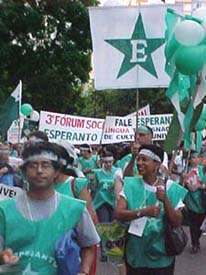SPEAKING UP FOR ESPERANTO
Ginanne Brownell - republished by Proteo | 08.08.2003 15:30

Esperanto supporters march at the 3rd World Social Forum_January 2003
Yet for such an ambitious and unlikely idea—three quarters of the words are from Romance languages and the rest from Slavic, Greek and Germanic tongues—it has earned its share of notoriety. Saddam Hussein felt so threatened by it, he expelled Iraq’s only Esperanto teacher during his tyrannical regime. And billionaire benefactor George Soros owes his prosperity to the idea: he defected from Communist Hungary at the 1946 World Esperanto Congress in Switzerland.
To hear a growing number of enthusiasts tell it, the language’s most glorious day may actually lie ahead. Though numbers are hard to come by—and those available are hard to believe (the Universal Esperanto Society estimates 8 million speakers)—the language may be spreading in developing nations in Africa, Asia and South America. “Because of the Internet, we have seen a vast improvement in the levels of competent speakers in places like China and Brazil,” says Humphrey Tonkin, a professor of English at the University of Hartford and the former president of the Universal Esperanto Association (UEA).
Meanwhile, a small community of diehards has been lobbying to make it the official language of the European Union. Indeed, Esperanto seems perfect for a modern age, when global barriers are being torn down by free trade, immigration and the Internet—and where activists, hobbyists and intellectuals across the globe are communicating as never before.
The renewed enthusiasm for the language was on display last week in Goteborg, Sweden, the site of the 88th annual World Esperanto Congress. Some 1,800 members of the UEA—from places as varied as Japan, Israel, Nepal and Brazil—conversed in what sounds like a mixture of overenunciated Italian and softly spoken Polish. Organizers say attendance outstripped last year’s meeting by almost 20 percent. Meanwhile, the number of Esperanto home pages has jumped from 330 in 1998 to 788 in 2003.
So what’s the big appeal? Unlike that other global language, Esperanto puts everyone on a level playing field; native English speakers make up only 10 percent of the world population, but they expect everybody else to be as articulate as they are. “Throughout Asia, for example, people are conscious of the language problem because they all speak different languages,” says John Wells, professor of phonetics at University College London. “Some are questioning whether they have to use English as their language for wider communication or whether there is some other possible solution.”
The majority of Esperanto speakers still live in Europe, where the language was invented by Ludovic Zamenhof, under the pseudonym Doktoro Esperanto (meaning “one who hopes”). Back in his time, people were drawn to Esperanto because it is five times easier to learn than English and 10 times simpler than Russian; Leo Tolstoy reportedly learned it in four hours. But as the language’s popularity grew, so did fears—especially among tyrannical rulers. Hitler claimed it could be used by Jews “to dominate more easily.” Stalin, threatened by the idea of global communication, sent thousands of Esperanto speakers to Siberian gulags. Gradually, the numbers began to drop off.
Nowadays, European Esperanto speakers tend to be older throwbacks to the cold-war era—though students in Poland and Hungary can still earn Ph.D.s in the language. Many believe the popularity of the dialect in the developing world is being fueled by growing resentment of English as the language of global commerce and political rhetoric. “Bush and Blair have become Esperanto’s best friends,” jokes Probal Dasgupta, professor of linguistics at India’s University of Hyderabad. “Globalization has put a wind in our sails, making it possible for people to have interest in Esperanto as not only a language, but a social idea.” Similar hopes have been voiced from the moment Zamenhof first came up with his egalitarian lingo. But in today’s rapidly shrinking world, the timing couldn’t be better.
Ginanne Brownell - republished by Proteo
 Homepage:
http://www.msnbc.com/news/947578.asp?cp1=1
Homepage:
http://www.msnbc.com/news/947578.asp?cp1=1
Comments
Display the following comment